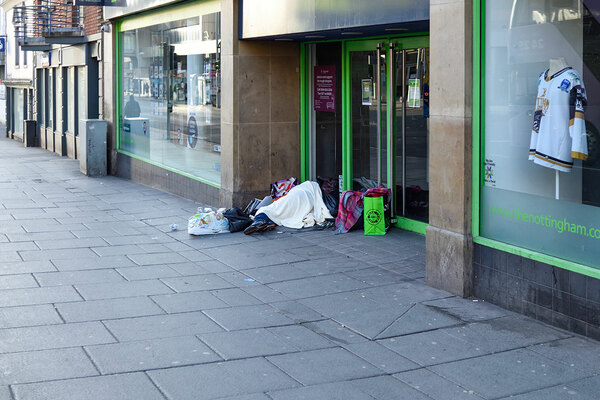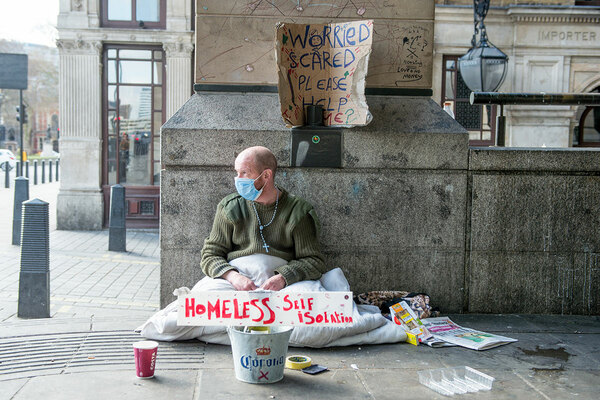You are viewing 1 of your 1 free articles
We cannot abandon communal shelters with no practical alternative in place
It would be nice to live in the world where communal shelters are not necessary. But until we get there, we cannot dismiss them without an alternative, writes Lucy Abraham
The COVID-19 pandemic has brought to light some of the challenges of shared sleeping spaces. And now some are calling for a permanent end to communal shelters for people experiencing homelessness.
I also wish we lived in a world where communal shelters didn’t have to exist, and I say that as the chief executive of the largest network of emergency winter night shelters in England. However, we cannot and should not dismiss this format without a viable alternative for the many thousands of people for whom they are a lifeline each year.
All year round, our shelter hotline rings with desperate callers telling us they have nowhere else to turn. Many have tried the council and have been told they aren’t eligible for support. We sheltered 839 people this past winter, more than ever before.
Yet for every 10 people who found a safe spot inside a church-based Glass Door shelter, 14 others never progressed off the waiting list. People sometimes waited weeks to secure a space. The sad truth is that even with this most basic alternative to sleeping on the street or a bus, or staying in a bad relationship, we cannot meet demand. Without communal winter night shelters, where will all these people go?
“All year round, our shelter hotline rings with desperate callers telling us they have nowhere else to turn. Many have tried the council and have been told they aren’t eligible for support”
Criticism of communal night shelters often misses a vital point about their function and purpose. Night shelters are stepping stones to a permanent end to our guests’ homelessness, rather than an end goal. Glass Door case workers work tirelessly with the guests who stay in our night shelters to find them more permanent routes off the streets.
Offering a period of stability enables our guests to get their lives back on track. Some guests are able to work while sleeping in the shelters, which would be incredibly difficult if they were still sleeping rough.
Many of our guests tell us their stay in a communal night shelter saved their lives, and many talk about the respect and dignity afforded to them thanks to the kindness of the staff and volunteers involved.
“I got the shelter I needed, and a good meal,” wrote a female guest of our Wandsworth shelters in our latest annual survey. “Just to have that contact with someone who is living a normal life is so important. It has given me a sense of normality and really helped me to cope with my situation,” she added.
A total of 70% of guests reported feeling more positive about the future than when they arrived, according to the survey.
We recognise that night shelters may not be able to run this coming winter because of concerns around the spread of COVID-19, at least not in their current format. We are preparing to provide shelter and support for as many people as we can by adapting our service. But we are also asking: where will the thousands of people who usually stay in communal night shelters go?
We are hopeful that many of the 15,000 individuals who were housed in hotels during the pandemic will be supported to find somewhere permanent to call home, and great progress has been made already. But too many of these individuals are not able to access permanent accommodation due to their immigration status.
And what about people who are becoming newly homeless as a result of the pandemic?
Glass Door’s frontline staff are already seeing the impact of people losing their jobs and houses, with an increase in the number of people who have never been homeless before turning to us. The end of government measures – such as the eviction prevention scheme, currently due to end in less than a week, and the furlough scheme and mortgage holidays, both due to end on 31 October – are likely to cause a new wave of homelessness this winter.
“Unless critics can point to an alternative for all those who usually turn to shelters like ours, it is likely that large numbers will resort to bedding down on the streets”
Of course, I fully support calls for more social housing and a greater breadth of affordable housing options so that everyone has access to a safe, permanent home. However, I don’t see it as an either/or distinction. Hotels won’t necessarily be available in future winters.
Unless critics can point to an alternative for all those who usually turn to shelters like ours, it is likely that large numbers will resort to bedding down on the streets.
Sleeping on the street or sleeping in a shelter should never be the only two options. And no one should claim that communal night shelters are a long-term solution to end rough sleeping. But personally, I would feel safer on a church floor at night than on the street. The several hundred guests who choose to stay with us each year clearly agree.
How can we dismiss communal shelters with no practical alternative in place? Ideally, homelessness charities would not need to exist because everyone would have a safe place to go. Until that day, we will continue to provide routes off the street for as many people as possible in a manner that is safe and humane.
Lucy Abraham, chief executive, Glass Door











